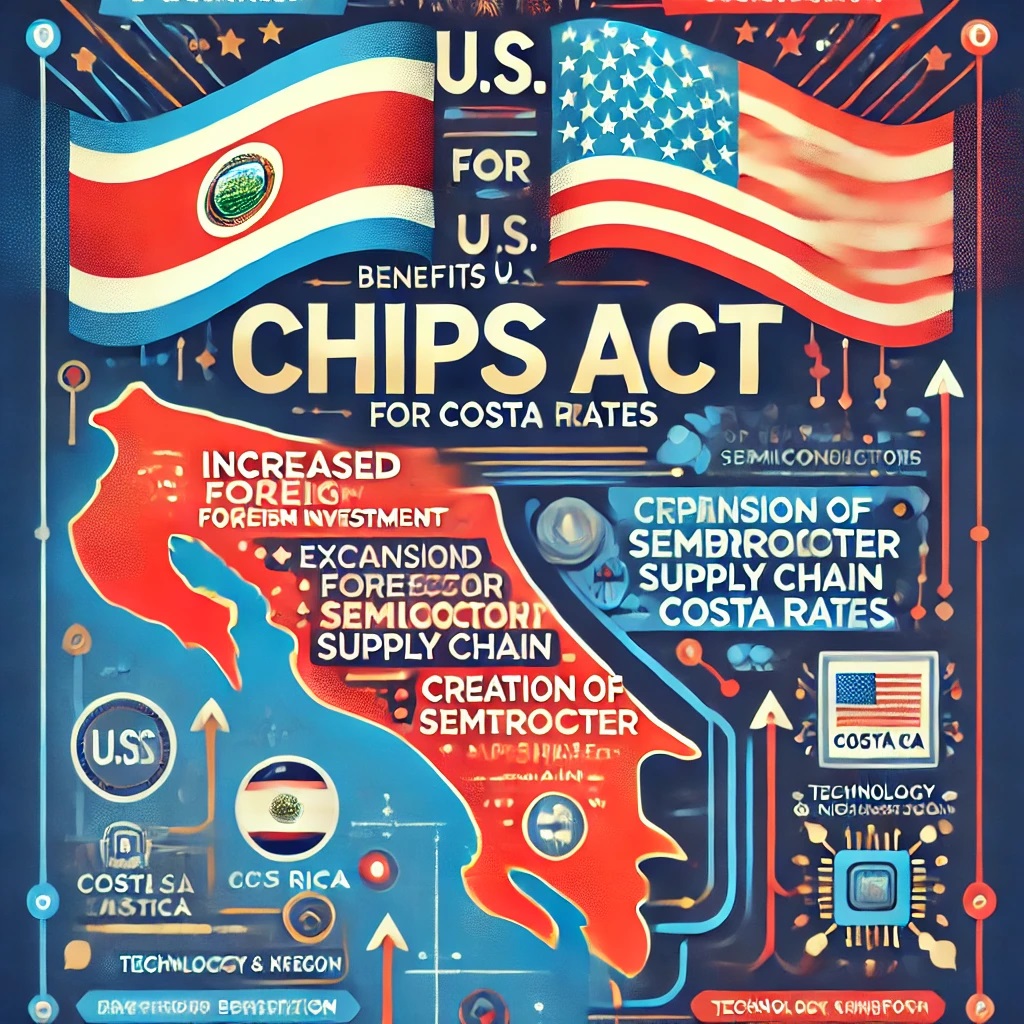The U.S. CHIPS Act: A Gateway for Costa Rica’s Growth in the Global Semiconductor Supply Chain
Applied Materials, a leading company in semiconductor industry solutions, has announced that it will begin operations in Costa Rica in 2025. The multinational will establish its first Global Services Office in Latin America in Heredia, where it is expected to create at least 100 jobs in its initial phase. The new office will focus on optimizing semiconductor manufacturing processes, advanced display technologies, and packaging.
Costa Rica was chosen for its strong infrastructure, specialized talent, and the benefits of the Free Trade Zone regime, along with incentives from the U.S. CHIPS Act aimed at strengthening the global supply chain. The specific investment amount has not yet been disclosed, but this operation is set to position Costa Rica as a key regional hub for this emerging industry.
This announcement was made during an official visit by President Rodrigo Chaves to Silicon Valley, highlighting the country’s strategy to attract high-tech and semiconductor investments.

The U.S. CHIPS Act not only benefits the United States but also holds positive potential for countries like Costa Rica, particularly in its role within the global semiconductor supply chain. Here’s how:
Increased foreign investment: U.S. companies like Applied Materials choose countries with favorable conditions, such as Costa Rica, to establish operational centers due to the incentives created by the CHIPS Act. With its solid infrastructure, skilled talent, and free trade zone regime, Costa Rica becomes an attractive destination for companies seeking to optimize costs and efficiency in their supply chains, taking advantage of the tax benefits provided to those contributing to the industry’s growth.
Supply chain expansion: The CHIPS Act promotes the creation of a more robust and diversified semiconductor supply chain, aiming to avoid dependence on a single country or region. This opens the door for countries like Costa Rica to become key nodes in this global network, attracting tech companies that seek to establish operations closer to the U.S.
Knowledge and technology transfer: As high-tech companies expand in Costa Rica, the country benefits from the transfer of knowledge and technological advancements. This can elevate the training and specialization of Costa Rican talent in advanced areas such as semiconductor manufacturing, materials research, and advanced packaging, boosting the country’s competitiveness in the region.
Boost to economic growth: By fostering the creation of jobs in the semiconductor and high-tech sectors, the CHIPS Act can contribute to Costa Rica’s economic growth, attracting investments that generate skilled employment and diversify its economy.
In summary, the U.S. CHIPS Act incentivizes tech companies to expand into countries with complementary capabilities like Costa Rica, drawing in investments, skilled jobs, and opportunities for technological growth.
Key points of the CHIPS Act:
Financial incentives: The law allocates over $52 billion in subsidies and support for research, development, and manufacturing of semiconductors within the U.S. This includes funds for building chip factories and other critical elements in the semiconductor supply chain.
Research and development: The act also promotes investment in scientific research, directing funds towards innovation projects in fields such as artificial intelligence, quantum computing, and materials science.
National security and global competitiveness: By investing in the semiconductor industry, the U.S. aims to reduce its vulnerability to global supply chain disruptions while better competing with countries like China, which has made significant investments in its own technological production capacity.
Support for advanced manufacturing: The law encourages the creation of advanced manufacturing plants (known as fabs) in the U.S., which could generate thousands of jobs and revitalize the country’s high-tech manufacturing sector.
Conclution:
The U.S. CHIPS Act not only strengthens semiconductor production in the United States but also creates opportunities for countries like Costa Rica. With incentives to attract foreign investment, the act promotes the diversification of the global semiconductor supply chain. Costa Rica, with its strong infrastructure and skilled workforce, positions itself as an attractive destination for tech companies looking to expand. Additionally, the country would benefit from knowledge and technology transfer, boosting its economic growth and competitiveness in the high-tech sector.
¡Pura vida!
Jorge Gutiérrez Guillén
#SemiconductoresCR #TecnologíaCostaRica #InversiónAltaTecnología #CHIPSActImpact #CostaRicaInnovación



